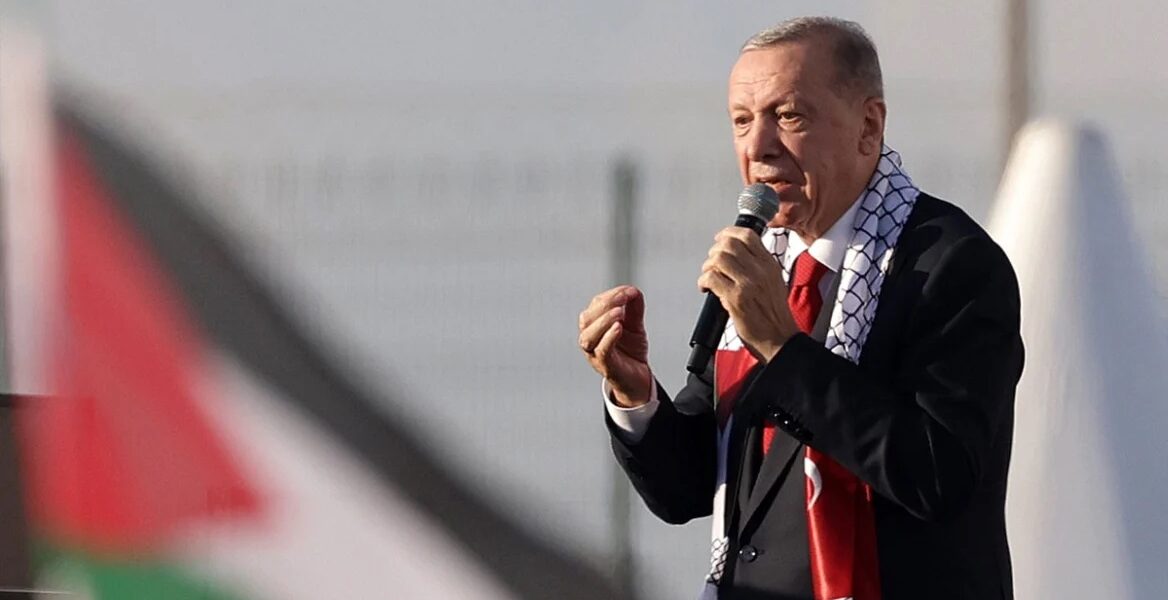With the scene in the Middle East hinting at long-term tension with unpredictable consequences, Greece has repeatedly sounded the alarm about the prospect of a wider flare-up. In this turbulent setting, however, our country is trying to maintain the excellent.. level of communication that was formed in the previous period with Turkey, even though the neighbouring country has chosen to launch threats against the West, appearing as the protector of Muslims everywhere.
The Saturday appearance of Recep Tayyip Erdoğan in a large pro-Palestinian demonstration was indicative of the strategy followed by the Turkish president, which has brought him into a new phase of rupture with Israel, which is withdrawing all its diplomats.
At the same time, Erdoğan systematically refuses to name Hamas as a terrorist organisation, given Ankara's ties to the Palestinian extremist organisation.
Erdogan: “Israel has been openly committing war crimes for exactly 22 days, but Western leaders have not even called for a ceasefire on Israel, let alone reacted to it. We will introduce Israel as a war criminal to the world”
— Ragıp Soylu (@ragipsoylu) October 28, 2023
Last Friday, in the wake of the Brussels Summit, Greek Prime Minister Kyriakos Mitsotakis positioned himself for Turkey's position, choosing a rather "surgical" approach that differentiates Greece from its neighbour's stance but at the same time does not undermine the low-intensity environment that is proving durable, Proto Thema reported.
"I am categorical; Hamas is a terrorist organisation", underlined the prime minister, adding that in this matter ", President Erdoğan is completely out of tune when he does not recognise this reality of what exactly Hamas constitutes".
"Beyond that, however, the fact that we disagree on this issue should not affect the context of the Greek-Turkish dialogue and the important steps of progress that have been made in recent months," the prime minister hastened to add, giving the stamp of "disassociation" of the Greek-Turkish people from the wider developments in the Middle East.
This, of course, is not always easy, as what happens in our neighbourhood will have wider implications. However, as long as the "calm waters" are maintained, this is a favourable development for Athens.
Already, after all, it seems that the closer cooperation is reflected in reduced migration flows in the Aegean, while in the next period, the Greek-Turkish cooperation on the matter is predicted to become closer with the installation of a Greek Coast Guard official in Izmir and a Turkish one in Mytilini to have a direct channel.
At the same time, the processes for the Supreme Cooperation Council on December 7 in Thessaloniki are in full progress.
The humanitarian corridor
In this troubled environment, consultations are in full swing for an organised humanitarian corridor that the Europeans will "set up" for the civilians of Gaza.
Last Friday, French President Macron revealed the first idea to install the base of this corridor in Cyprus with the participation of Greek officials. If the idea is implemented, there will be the possibility for a humanitarian corridor by sea for essential goods.
As diplomatic sources explain, however, this plan is diplomatically extremely complex and needs to be more readily implementable.
In this light, our country is on an open line with other European countries involved in the planning beyond France, with the directly interested parties, including the Israeli side, but also with international organisations that have a presence in the region to be seen, if the scheme is feasible.
In any case, Greece wants to send the message that, despite its clear support for Israel, it is directly involved in any European plan to support civilians in the region, which is also a message from our country to the Arab world.
READ MORE: Flight from Israel to Russia’s Dagestan diverts as pro-Palestinian mob storms terminal.


